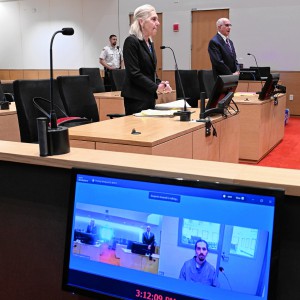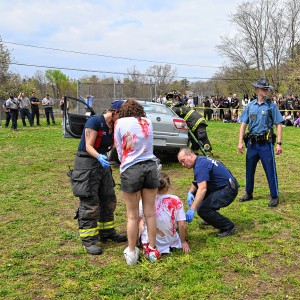Hospital, fire marshal issue warnings ahead of weekend cold snap
| Published: 02-02-2023 2:07 PM |
With temperatures expected to drop into the negative digits on Friday and Saturday, Baystate Hospital and the Mass State Fire Marshal have issued warnings and advice for how to cope with the cold.
Cold weather can be hazardous and result in frostbite, hypothermia, and increased risk of heart attacks, according to information provided by the hospital. The most common problems resulting from prolonged exposure to the cold are hypothermia and frostbite.
When exposed to cold temperatures, the body begins to lose heat faster than it can be produced. Prolonged exposure will eventually use up the body’s stored energy. The result is hypothermia, or abnormally low body temperature. A body temperature that is too low affects the brain, making the victim unable to think clearly or move well.
“Infants and the elderly are particularly at risk, and those who work outdoors, but anyone can be affected,” said Dr. Brian Sutton, medical director at Baystate Health Urgent Care. “Exposure to extremely cold temperatures can lead to what is called cold stress and can result in a variety of cold-related illnesses.”
Sutton noted a body temperature below 95 degrees Fahrenheit requires emergency medical attention. Hypothermia is signaled in adults by confusion, sleepiness, reduced breathing and heart rate, and extreme shivering, while infants may have bright red, cold skin and very low energy.
“What is especially concerning with hypothermia affecting your brain function is that a person suffering from hypothermia may not realize what is happening to them or realize they need medical assistance,” said Sutton.
While waiting for help to arrive, begin warming immediately by getting the person indoors and removing any wet clothing they may be wearing. Warm the center of the body first—chest, neck, head and groin area—using an electric blanket, if possible. Skin-to-skin contact under loose, dry layers of blankets, clothing, towels or sheets is also effective. Warm beverages can also help increase body temperature. Once the body temperature has increased, keep the person dry and wrapped in a warm blanket, including the head and neck.
Sutton noted symptoms of frostbite include numbness and a white cast to the skin in the affected area with the most susceptible body parts being fingers, toes, ear lobes, and the nose. He suggested warming the frozen part to room temperature by immersing it in warm (not hot) water to avoid burns to the skin. Frozen tissue is fragile and can be damaged easily. Avoid warming with high heat from radiators, fireplaces or stoves and avoid rubbing or breaking blisters.
Article continues after...
Yesterday's Most Read Articles
 Work on Pinedale Avenue Bridge connecting Athol and Orange to resume
Work on Pinedale Avenue Bridge connecting Athol and Orange to resume
 PHOTOS: Enchanted Orchard Renaissance Faire at Red Apple Farm
PHOTOS: Enchanted Orchard Renaissance Faire at Red Apple Farm
 Lawyer argues Joshua Hart’s 2018 conviction for Orange murder had inconsistent verdicts
Lawyer argues Joshua Hart’s 2018 conviction for Orange murder had inconsistent verdicts
 UMass basketball: Minutemen nab another transfer in Arizona State forward Akil Watson
UMass basketball: Minutemen nab another transfer in Arizona State forward Akil Watson
 ‘Arrive Alive’ shows Athol High School students the dangers of impaired driving
‘Arrive Alive’ shows Athol High School students the dangers of impaired driving
 Orange Selectboard declares armory as surplus property
Orange Selectboard declares armory as surplus property
State Fire Marshal Peter Ostroskey warned residents to avoid fire and carbon monoxide hazards while heating their homes.
”Home heating equipment is the second-leading cause of residential fires and the main source of carbon monoxide at home,” Ostroskey said in a release issued on Thursday. “Working smoke and CO alarms are your first line of defense against these hazards. With furnaces, fireplaces, and space heaters working overtime this weekend, be sure they’re installed on every floor of your home and test them to be sure you and your family are protected.
When purchasing a space heater, Ostroskey recommended one that’s been tested and labeled by a nationally recognized laboratory such as Underwriters Laboratories or Intertek. Newer space heaters should have an automatic shutoff switch that turns the device off if it tips over. Portable propane and kerosene space heaters are illegal for sale and use in Massachusetts due to the risk of fire and carbon monoxide poisoning that they pose.
Solid fuel heating appliances such as fireplaces and wood stoves have accounted for a rising share of home heating fires in recent years, according to the press release. Open the dampener before lighting a fire; use only dry, seasoned wood; don’t use flammable liquids to start the fire; and keep a three-foot circle of safety around the fireplace or stove free of anything that can burn.
Residents should shovel ashes from the stove or fireplace into a metal bucket with a metal lid and place it outside on the ground away from the building—not in the trash. Most chimney fires occur because of a buildup of creosote, a tarry byproduct of burning wood: fire officials recommend having your chimney and flue professionally inspected and cleaned each year.
Those with a furnace, water heater, or oil burner with a pilot light should keep a three-foot circle clear of anything that could catch fire, and not store gasoline, painting supplies or other flammable solvents in the home—the vapors can be ignited by a pilot light. These systems should be checked annually by a professional, as well. If gas can be smelled, don’t use any electrical switches or devices, leave the house and call 911.
Ostroskey recommends a home escape plan that includes two ways out of every room, and everyone should be able to open the doors and windows along the way. Children, older adults and people with disabilities may need extra assistance.

 Sportsman’s Corner: The quest for the Super Slam
Sportsman’s Corner: The quest for the Super Slam Annual ‘Food-A-Thon’ returns
Annual ‘Food-A-Thon’ returns Erving Town Meeting voters back Care Drive housing project
Erving Town Meeting voters back Care Drive housing project North Quabbin Notes, May 9
North Quabbin Notes, May 9